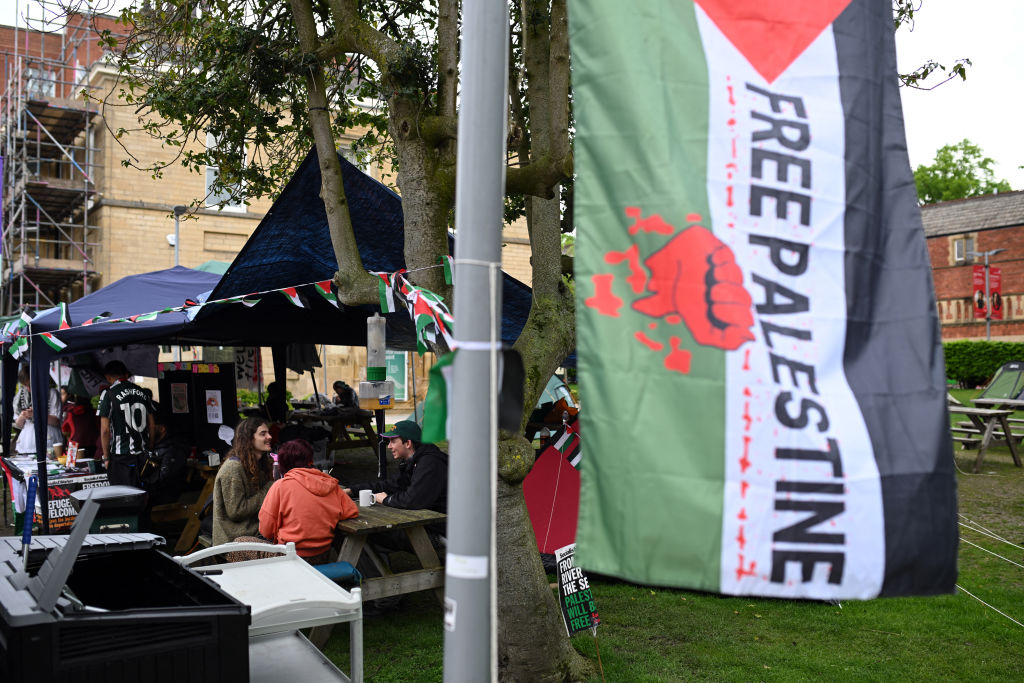A hot topic in the past few weeks has been the degrees of ignorance often displayed by those protesting for the people of Gaza and Palestine. To put it pithily, many don’t seem to know from which river and to which sea they chant about with such passion. Such ignorance has prompted some to conclude that these protests are less about showing solidarity with beleaguered Palestinians and more an excuse to vent incoherent anti-Western sentiment, or, more sinisterly, old-fashioned antisemitism.
Some of the protestors have been replicating what they believe to be the conditions in Gaza
Similarly, the cosplay in evidence at American college campuses has also cast doubt on the authenticity of these demonstrations. In their fondness for pretending to be starving refugees in a war zone, bedded down in tents right opposite cafes and restaurants, many of these cosseted, affluent students appear to be grotesquely detached from reality — less bothered about Gaza and more concerned with self-indulgently “feeling their pain” in these ostentatious, ersatz displays of solidarity.
Yet the recent emergence of copycat protests and “encampments” in the UK, first at red-brick universities and more recently at Oxbridge, indicates that there’s something stranger going on. Just as some critics of radical trans ideology regard the rapidity in which that fashion took hold as an example of social contagion, what we are witnessing here could be seen as something similar: an example of low-level, mass hysteria.
The sheer level of fidelity to, and mimicry of, the protests in the US has been a glaring aspect of the encampments in Britain, and the discourse that has been accompanying the protests worldwide. There’s been the mandatory, identikit invectives against “Zionists” and “white supremacy” and automatic, repetitious sloganeering concerning “the river to the sea.”
In America, protesters keen to immerse themselves in acts and displays of empathy have gone full Method — or full fantasy. Some have been pleading for food and space in their valiant protests on behalf of their “Vietnam,” demanding “basic humanitarian aid” lest they “die of dehydration.”
Some of their number have been replicating what they believe to be the conditions in Gaza. Students at UCLA have been so consumed by this indecorous mood of play-acting worthy of Marie Antoinette that last week some took it upon themselves to pray en masse to Allah — or at least simulate of an act of prayer. Whether or not all the pro-Palestinian protesters who took part were Muslim wasn’t clear.
Students in Britain and throughout the Western world have not merely establishment copycat encampments, but they have entered into the same spirit of unreality. Activists of the Oxford Action for Palestine group declared a “liberated zone” outside the Pitt Rivers Museum. Oxford protesters have asked for plywood, bags, tarpaulins, chairs and gazebos — notwithstanding the fact that the university city has both a branch of Homebase and B&Q.
Elsewhere, on Instagram a pro-Palestine group called Newcastle Apartheid has posted an “urgent callout” for “blankets, food for community dinner” to allow its encampment at the city’s university to continue. Protesters at University College London have likewise asked members of the public to donate “nutritious and healthy” food to their group, and the Daily Telegraph spotted pillows and food supplies being lifted over campus gates on Friday afternoon. Both Newcastle and London are not wanting in stores that sell food.
This is quite consciously and openly a development imported from the United States. “The US movement set off a global chain of reaction. We are excited to part of that,” admitted one Oxford protester to a Times of London reporter yesterday. “We have had a lot of support from them in terms of logistics, general comradeship, giving us tips and tricks.”
A pro-Palestine group called Newcastle Apartheid has posted an ‘urgent callout’ for blankets
That seems to be quite a rational statement of intent. It is normal that those seeking to mobilize support for a cause should share logistics and tactics. What is decidedly far from normal is the inherent fantastical element to this now global movement, this empathetic impulse that has tipped over into the realm of make-believe and play-acting.
It is an impulse that has evident universal appeal. That the keffiyeh has become a mandatory accessory among protesters is entirely in keeping with the detachment from reality afoot here. In other circumstances students would vehemently denounce anyone who to pretended to be an Arab, condemn him or her as guilty of “cultural appropriation.” But normal rules don’t apply when normality itself now seems in doubt.
The inauthenticity at the heart of much of the protests, is fitting, too, with the ignorance of many doing the protesting. Yes, this is about the people of Gaza. Yes, it is also about registering anti-Western, anti-authority and anti-Israeli sentiment. But it also appeals to a desperate desire to belong, to an otherwise atomized smartphone generation that sometimes can’t tell the difference between reality and fantasy. It is an otherworldly phenomenon for irrational times. No wonder the hysteria is spreading with such virulence.
This article was originally published on The Spectator’s UK website.


























Leave a Reply